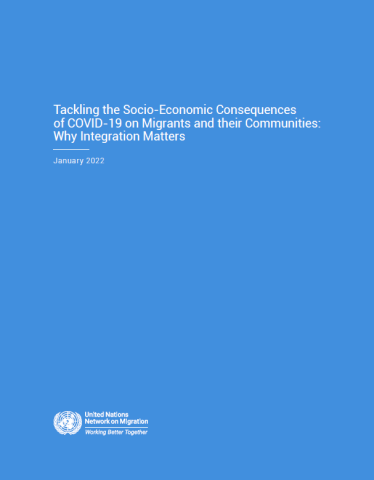Library
Discussion paper: Tackling the Socio-Economic Consequences of COVID-19 on Migrants and Communities: Why Integration Matters
At a glance
This paper assesses the socio-economic impact of the COVID-19 pandemic on migrants, outlining some of the policy and programme responses that different stakeholders, at local, national and international levels have adopted in response and the cost of not doing so. The paper makes specific recommendations aimed at promoting migrants’ socio-economic (re)integration and social cohesion.
What it offers
The paper provides an overview of COVID-19 responses taken and also presents some previous initiatives that, if more widely adopted, could facilitate migrants’ and communities’ (re)integration and preparedness to prevent similar detrimental consequences in future crises. Within this framework, a broad approach to integration and reintegration is taken, looking at issues such as labour markets, gender equality, social protection and peaceful coexistence, both in countries of destination and upon return in countries of origin. The paper provides a unique perspective by:
- Presenting a clear overview of the socio-economic impacts of the COVID-19 crisis on migration
- Providing insights into innovations and exacerbated challenges related to socio-economic responses to the COVID-19 crisis
- Highlighting the importance of socio-economic (re)integration and social cohesion beyond the immediate COVID-19 response
Further information
This UN Network on Migration Discussion Paper is the result of an active collaboration between the International Labour Organization (ILO), the United Nations Development Programme (UNDP) and the other members of the Network’s Executive Committee (IOM, OHCHR, UNDESA, UNHCR, UNICEF, UNODC and WHO), in partnership with the United Nations University – Maastricht Economic and Social Research Institute on Innovation and Technology (UNU-MERIT).
